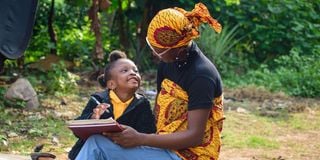Would you take your young child to boarding school?

My daughter, to date, thinks I made a mistake in taking her to boarding school when she was young.
At St Elizabeth Academy in Nairobi’s Karen location, any child who has graduated from using diapers can be in boarding school.
Its proprietor Anne Wanjiku Munene tells DN2 Parenting children just getting started with their primary school journey can stay at the school full-time.
“We normally have the boarders starting from Grade One, and that is because at Grade One, they have stopped using diapers. But children with diapers are not allowed to be boarders,” she says. “We recommend any age that is not using a diaper.”
A range of reasons, she notes, makes parents want to have their children in a boarding set-up. One of them is the type of business the parent is engaged in.
“If they are working in Marikiti and they have to wake up very early and they sleep very few hours, and they are in Marikiti seven days a week, these people don’t have time for the kids,” says Ms Munene.
“And if a parent is importing things from China to go and sell them in Malawi, they don’t have time to sit down and check the homework and the handwriting of a child. This is why they bring them to boarding school,” she adds. “They also bring them to boarding school if they are running very busy offices where they are employed, and they find that they are so exhausted at the end of the day that it becomes difficult for them to manage the children. So, we offer a five-day boarding for such parents.”
The debate on the ideal age for a child to join boarding school has been reignited following the September 7 incident in Nyeri County where 21 children at the Hillside Endarasha Academy died in a dormitory fire. Those who died were aged between 9 and 12, and the average age of learners at the institution has been put at nine.
That children in the second to third year of primary school education could find themselves in a boarding environment is a matter that has raised debate, with strong arguments on either side. On one side of the debate are persons like author Deborah Auko Tendo, the woman behind the book Rough Silk.
“Stop blaming the parents who have lost kids in the fire disaster. Having a child is like having your heart live outside your body. Anything can happen to it and you have no control,” she posted on Facebook while responding to the other side that argued that taking a child to boarding school too early in life is leaving them to their own devices when they need parental mentoring and coaching.
Ms Tendo went to boarding school aged nine because she was in a troubled family setup where her parents tussled over who should take custody of her. When she was a day scholar, she would sometimes be snatched by one parent on the way from school and hidden.
“Boarding schools are okay if only, as parents and teachers, we can keep a standard that’s safe and healthy for the growth of children; where children are not prone to mental harm, hunger, neglect, bullying or hazards like fires. There are special kinds of kids that are better off in boarding schools,” Ms Tendo wrote.
Also Read: Does your child enjoy school?
Nation Lifestyle spoke with 67-year-old Nairobi resident Jane Ouma who went to boarding school in Standard Four and took her daughter to boarding school from Class One to Class Eight.
“I did not see anything wrong with boarding school. However, my daughter, to date, thinks I made a mistake to take her away when she was that young,” Ms Ouma said.
The front office expert said she enrolled her daughter in a boarding school because she could not secure admission anywhere else. She was six but tall, and most schools only took in seven-year-olds.
“So, all the schools I went to could say no. But the girl was tall, and she looked too big for her age. So, she schooled in boarding school,” said Ms Ouma.
However, with hindsight, Ms Ouma believes she should have waited. “Now, the way I see it, it is not proper to take children to boarding school too early. We can take them perhaps in Class Six. I took my grandchild to boarding school at Class Four. Why? I had taken the child to a private school in Nairobi and I was not seeing any (progress). So, I took him to a boarding school, and he did well,” noted Ms Ouma.
Mr Francis Ohuru, another Nairobi resident, took his daughter to boarding school when she was in Standard Four. “At that school, they were boarding from Standard One to Eight. I didn’t experience any problems because, in that school, children were always under the care of the school matron. So, my child finished school without any incident and left for high school. She is now done with education,” he said.

Parents send their teenagers to boarding schools primarily for better education and to learn to live independently
The concept of boarding schools dates back to the colonisation of Kenya. A paper published by the Kenya Scholars and Studies Association in 2021 states that pioneering teachers in Kenya saw the schools as a way to “fast-track” learning and also draw some children from their “inhibitive” backgrounds.
“Kenya’s past experience was not different from boarding schools for native ‘Indians’ in the USA that were built with the clear intention of assimilating them into the mainstream American way of life and intended to eradicate all vestiges of Indian culture,” said the paper written by Dr Charles Manyara, who is based at Radford University in the US.
“The post-independence expansion of boarding schools was born out of the need to meet the competitive job market and admission to the best schools available. The haste for parents to send their children to boarding schools picked up in the 1970s and more so in the 1980s. The prevailing perception in Kenya was that anyone wishing to raise successful children ought to send them to a boarding school,” Dr Manyara added. “Parents send their teenagers to boarding schools primarily for better education and to learn to live independently.”
The fad has not died down, and it is the one that has led to the thriving of institutions like Endarasha.
Ms Munene, the proprietor of the Karen-based institution, said that 90 per cent of her pupils are boarders.
If homesick children in boarding schools could sue, they have the 2022 amendment of the Children Act on their side.
“Except as is otherwise provided under this Act, every child has the right to live with his or her parents,” says the law that took effect in July 2022.
It adds that a child can only be separated from parents “where the [children’s] court or the [Cabinet] Secretary determines that the separation is in the best interest of the child”.
Ms Munene says family troubles and the absence of one parent also create the need for children to live in their schools.
“We also have boarders where one of the parents has passed away, and there’s only one parent left to take care of them. At times, they have to look for money to pay the mortgage, and this is why they bring the kids to the boarding school. They normally pick them on the weekends,” says Ms Munene.
“To me, the boarding environment is the best, given the type of things that are shown on the internet,” she adds. “To me, the best study environment for the children in the Republic of Kenya is one that is free of phones.”
Some of the people who have been subjected to boarding school as children have previously voiced their resentment to the arrangement. Some say they became withdrawn from their parents, became too aggressive, or found it hard to socialise.
Mr Erick Kirimi wrote in an article in the Nation in 2017 that he was taken to boarding school when he was barely seven years.
“The feeling of abandonment has stuck with me ever since,” he wrote. “At this vulnerable age, what children need most is an emotionally meaningful relationship, not pressure. And only parents can offer that. Teachers, however, dedicated, cannot provide emotional satisfaction to every kid in the class.”
He went on: “Boarding schools are a fraud; a shell game. Parents are short-changed. It is humbug to pretend that we don’t see that. There is nothing special they offer kids below 13 years which parents cannot provide at home.”
Nation Lifestyle posed to Dr Philomena Ndambuki, a psychologist who has specialised on child development, the question of whether going to school too early has an impact on a child’s wellbeing.
“I was in a boarding school from Class Four to Form Four in high school. It worked well for me and the other students because the school management was very good,” said Dr Ndambuki. “My recommendation is that it is possible to run a boarding school for young children.”
Ms Munene said that at her school, children have a nanny who attends to the younger children day and night.
“The services that we give the kids are equal to those of a mother. We take care of their homework, we take care of their feeding, and we also take care of their learning. And while we find that you have a boarding school, the best that you can do is to be alert. You have to be alert at all times, imagine the kids are yours,” she said.
One of the people who don’t buy into the theory of boarding schools being better than day ones is Mr Kennedy Buhere, a communications officer at the Education Ministry.
In a December 2022 article in the Nation, weighing on a plan by the government to ban boarding school for learners from Grade One to Nine, he stated: “The argument that boarding school gives learners more time to study and play doesn’t hold water. Day schools don’t compromise students’ learning and play. The Basic Education Regulations 2015 take care of the instructional needs of all learners, regardless of whether they are in boarding or day school.”
Even Ms Tendo, in her recollection of the life she led at her primary school as a boarder, where the conditions required one to be tough to withstand the theft of items and the survival-for-the-fittest environment, says sometimes young children are thrown in the deep end.
“There is no glory in that. That is not how children should grow up. That is not how human beings should develop,” she wrote as she made her case for boarding schools with pro-child standards.
The safety standards manual for Kenyan schools outlines several safety measures for dormitories.
They include a provision that there should be a space of at least 1.2 metres between beds; a doorway that is at least five feet wide and which opens outwards; a door at each end of the dorm and an emergency exit in the middle; windows that don’t have grills and which open outwards; fire extinguishing equipment, among others. However, these are often overlooked, only to be discovered when learners have died at an institution.
“There is no one school or school structure that is perfect for all students. Students bring with them a variety of intelligence, dispositions, learning styles, cultures, religions, family backgrounds, and personal tastes and preferences. Therefore, there is a need to re-think and have an education system responsive to the needs of Kenya and its people in the 21st century,” wrote Dr Manyara.






